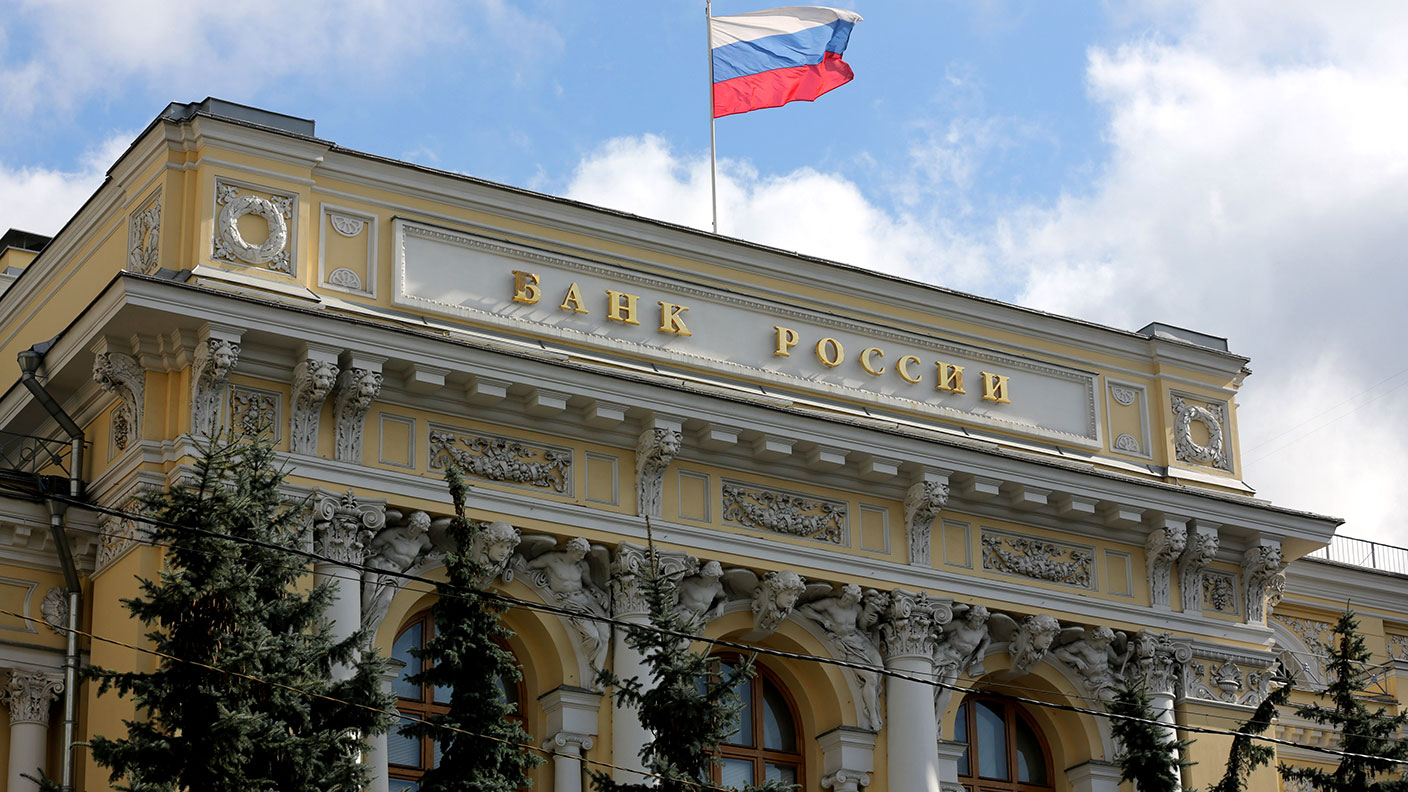Russia is now a financial pariah. What does that mean for markets?
With Russia being frozen out of the global financial system, John Stepek looks at what it means for markets, the global economy, and your portfolio.


Get the latest financial news, insights and expert analysis from our award-winning MoneyWeek team, to help you understand what really matters when it comes to your finances.
You are now subscribed
Your newsletter sign-up was successful
Want to add more newsletters?

Twice daily
MoneyWeek
Get the latest financial news, insights and expert analysis from our award-winning MoneyWeek team, to help you understand what really matters when it comes to your finances.

Four times a week
Look After My Bills
Sign up to our free money-saving newsletter, filled with the latest news and expert advice to help you find the best tips and deals for managing your bills. Start saving today!
By the close of play on Friday, markets appeared to have reverted to their “glass half-full” mentality.
Analysts were falling over themselves to say that sanctions would be mild; that there might be peace talks in the making. And markets rebounded somewhat.
Let’s just say, that’s not what happened. In fact, over the weekend, things escalated dramatically.
MoneyWeek
Subscribe to MoneyWeek today and get your first six magazine issues absolutely FREE

Sign up to Money Morning
Don't miss the latest investment and personal finances news, market analysis, plus money-saving tips with our free twice-daily newsletter
Don't miss the latest investment and personal finances news, market analysis, plus money-saving tips with our free twice-daily newsletter
It’s not an exaggeration to say that we are now in a full-blown economic war.
So it’s little wonder markets have had a rough start to the day.
Russia is being unplugged from the financial system
This morning, as I’m writing this, the oil price is back over $100 a barrel, stockmarkets around the world have fallen – though not dramatically – and the Russian rouble has tanked. For perspective, a fortnight ago, one pound would have bought you just under 104 rubles. As of this morning, it’ll get you 140. Not that you’d want to buy any, because chances are you’ll struggle to spend them on anything.
That’s because the US, UK, EU etc have done quite a bit over the weekend to unplug Russia from the global financial system. They have placed sanctions on the Russian central bank and are also excluding some (though not all) Russian banks from the Swift international payments system.
What does that mean? Rather than delve into the weeds on the technical bits, the important point is that it will make it hard for the central bank to defend its currency, and it’ll also make it very difficult for Russia to do business with any mainstream entity.
About the one area where there’s still some leeway is the energy sector. But as others have pointed out, how many banks are going to want to enable Russian business now that it’s a pariah (because they won’t want to risk breaking present or future sanctions)?
There have also been some other big moves. Germany has changed its foreign policy radically over the weekend. The country now plans to meet the Nato goal of spending 2% of GDP on defence from about 1.5% now, something the US has long been nagging Europe generally to do.
(US spending is at over 3.5% while the UK has consistently surpassed the 2% target. Latest data for 2020-2021 suggests France is now meeting it too, along with Greece, Croatia, Estonia, Latvia, Poland, Lithuania and Romania.)
European airspace is also being closed to Russian aircraft – that’s more bad news for airlines, though in the context of Covid, it’s probably relatively minor.
What does this all mean?
The risks to the financial plumbing
The rouble, most obviously, has collapsed. The Russian central bank has raised interest rates from 9.5% to 20%. Meanwhile, Russian firms will reportedly be forced to sell 80% of their foreign currency earnings – in other words, swap any dollars or pounds or euros they get for roubles, to help prop up the currency.
Those moves don’t so far appear to be helping the rouble a great deal. In effect, it has become a great deal harder to put a price on Russian assets. Helen Thomas of Blonde Money draws a comparison with the Lehman Brothers collapse in September in 2008, in that suddenly no one knew what a large swathe of assets dotted about the financial system was worth.
The difference here is that exposure to Russia in general has been declining as its bad behaviour has increased over the past decade, so it’s unlikely that it’s a 2008 moment for the financial system generally.
But to paraphrase Zoltan Posner of Credit Suisse, an analyst who has become the man to read for a rundown on the plumbing that underpins the financial system (even if anyone speaking honestly only understands about half of what he writes) – you can’t yank a country out of the global payments network without some payments getting missed and things getting messy as a result.
That’s the sort of thing that you’d think central banks are likely to be prepared for. They’re old hands at papering over the cracks, so I’d expect the worst of this morning’s volatility to die down pretty rapidly.
But for Russia? Quite possibly the 2008 comparison may not cover it. Severe inflation is almost certain at these levels and hyperinflation is a genuine risk.
What about the wider market reaction, beyond the initial rush to “safety” by investors desperately trying to raise cash and lose leverage?
In terms of fleeing from Russian assets, probably the most notable reaction from a UK-based, Russia-exposed company has been that of BP, which has decided to get rid of its near-20% stake in Rosneft, the Russian state-owned oil company. Javier Blas at Bloomberg estimates that this could cost BP up to $25bn to exit.
Small wonder the BP share price has taken quite the knock today, despite the surging price of oil.
Sometimes the best decision is to do nothing
This all goes back to the point I made on Thursday, that the big risk with Russian assets now was that they’d become unsellable due to sanctions or capital controls. That’s where we are now.
In the longer run, does it accelerate a possible move away from the US dollar as global reserve currency? Some say “yes”, but I’m actually not entirely sure that’s the logical conclusion.
It’s not that I disagree that this is the overall aim for some nations; China and Russia specifically have wanted to create an alternative system to US dollar hegemony for a long time. But it’s hard to set up a workable alternative to the current global financial operating system if everyone signing up for it is a pariah state. It’s not great marketing.
I’m not saying for a minute that the US dollar will always be the global reserve currency. I’m just saying that, to my mind, the jury’s out as to whether this might in fact slow rather than hasten any move away from the dollar (and not just in the short term – the dollar index inevitably jumped this morning as it always does when there are market jitters).
What can you do? My first point, as always, is to keep your head. Don’t be panicked into selling, or into buying. My second point is a reiteration of one I made on Thursday – this escalation is inflationary (and probably stagflationary). None of this makes it easier for the stuff we need to get from A to B, which drives up the cost of said stuff. So the points I made about making sure your portfolio is inflation-resilient still stand.
But mostly, I’d go back to my first point: making investment decisions at times like these is particularly fraught. If you intend to do it anyway, stick to your process and make sure you write everything down first. But be careful. There is a lot of scope for nasty surprises right now, even more so than usual.
Get the latest financial news, insights and expert analysis from our award-winning MoneyWeek team, to help you understand what really matters when it comes to your finances.

-
 How a ‘great view’ from your home can boost its value by 35%
How a ‘great view’ from your home can boost its value by 35%A house that comes with a picturesque backdrop could add tens of thousands of pounds to its asking price – but how does each region compare?
-
 What is a care fees annuity and how much does it cost?
What is a care fees annuity and how much does it cost?How we will be cared for in our later years – and how much we are willing to pay for it – are conversations best had as early as possible. One option to cover the cost is a care fees annuity. We look at the pros and cons.
-
 No peace dividend in Trump's Ukraine plan
No peace dividend in Trump's Ukraine planOpinion An end to fighting in Ukraine will hurt defence shares in the short term, but the boom is likely to continue given US isolationism, says Matthew Lynn
-
 Investors need to get ready for an age of uncertainty and upheaval
Investors need to get ready for an age of uncertainty and upheavalTectonic geopolitical and economic shifts are underway. Investors need to consider a range of tools when positioning portfolios to accommodate these changes
-
 Ukraine invades Russia – what are the political implications?
Ukraine invades Russia – what are the political implications?Ukraine's surprise invasion into Kursk could change the course of the war politically
-
 UK wages grow at a record pace
UK wages grow at a record paceThe latest UK wages data will add pressure on the BoE to push interest rates even higher.
-
 Trapped in a time of zombie government
Trapped in a time of zombie governmentIt’s not just companies that are eking out an existence, says Max King. The state is in the twilight zone too.
-
 America is in deep denial over debt
America is in deep denial over debtThe downgrade in America’s credit rating was much criticised by the US government, says Alex Rankine. But was it a long time coming?
-
 UK economy avoids stagnation with surprise growth
UK economy avoids stagnation with surprise growthGross domestic product increased by 0.2% in the second quarter and by 0.5% in June
-
 Bank of England raises interest rates to 5.25%
Bank of England raises interest rates to 5.25%The Bank has hiked rates from 5% to 5.25%, marking the 14th increase in a row. We explain what it means for savers and homeowners - and whether more rate rises are on the horizon